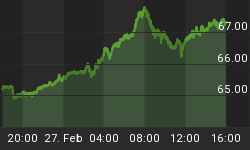ECB President Mario Draghi Declares Victory Over Deflation.
That's much like shouting hallelujah when you miss the game-winning field goal.

Mario Draghi has declared victory against deflation and moved a step towards ending the European Central Bank's ultra-loose monetary policy, sending the euro and German bond yields higher as investors bet on the end of crisis-era stimulus measures.
Facing growing pressure from monetary hawks in Germany, the ECB president said the bank decided to change its guidance to investors — omitting a reference to using all the weapons in its policy arsenal — because of its success against a destabilizing bout of falling prices.
Though the ECB agreed to keep interest rates at record lows, Mr. Draghi said the bank no longer had a "sense of urgency" to take further action on monetary stimulus and that policymakers "do not anticipate that it will be necessary to lower rates further".
ECB Q&A
Let's dive into the ECB's Q&A for more details.
I would say that risks of deflation have largely disappeared. Market-based inflation expectations have increased noticeably. Also those are longer-term horizons even though they are still below the level that is considered to be adequate for pronouncing victory on the inflation front. The financing conditions and credit demand have continued to improve. Lending rates for households and companies have declined significantly by more than our key interest rates.
According to Eurostat's flash estimate, euro area annual HICP inflation increased further to 2.0% in February, up from 1.8% in January 2017 and 1.1% in December 2016. This reflected mainly a strong increase in annual energy and unprocessed food price inflation, with no signs yet of a convincing upward trend in underlying inflation. Headline inflation is likely to remain at levels close to 2% in the coming months, largely reflecting movements in the annual rate of change of energy prices. Measures of underlying inflation, however, have remained low and are expected to rise only gradually over the medium term, supported by our monetary policy measures, the expected continuing economic recovery and the corresponding gradual absorption of slack.
Core HICP
Draghi failed to note the core HICP (Harmonised Index of Consumer Prices) is 0.9%.
If energy prices decline again, and I think they will, then Draghi's victory celebration may be premature.
For a discussion of the oil impact on price inflation, please see Year-Over-Year Import Prices at Highest Level in Five Years: Inflation Scare or the Real Deal?.
Also see CPI Jumps Most Since February 2013 on Energy: Did Gasoline Prices Really Rise 7.8% in January?
Blowing Bubbles
Thanks to the monetary policies of the Fed, ECB, Bank of China, Bank of Japan, and central banks in general, stock markets have now surpassed the 1929 high in bubbliness.
Only the dot-com bubble was bigger.
John Hussman has an excellent write-up of the bubble in When Speculators Prosper Through Ignorance.

Pater Tenebrarum at the Acting Man blog continues the discussion with Speculative Blow-Offs in Stock Markets – Part 2
Cheering Destruction
Cheering inflation is preposterous. Inflation does not cause growth, but measures to induce inflation can and do foster bubbles.
Economic Challenge to Keynesians
Of all the widely believed but patently false economic beliefs is the absurd notion that falling consumer prices are bad for the economy and something must be done about them.
I have commented on this many times and have been vindicated not only by sound economic theory but also by actual historical examples.
My article Deflation Bonanza! (And the Fool's Mission to Stop It) has a good synopsis.
And my Challenge to Keynesians "Prove Rising Prices Provide an Overall Economic Benefit" has gone unanswered.
There is no answer because history and logic both show that concerns over consumer price deflation are seriously misplaced.
The BIS did a study and found routine deflation was not any problem at all.
"Deflation may actually boost output. Lower prices increase real incomes and wealth. And they may also make export goods more competitive," stated the BIS study.
It's asset bubble deflation that is damaging.
And in central banks' seriously misguided attempts to fight routine consumer price deflation, central bankers create very destructive asset bubbles that eventually collapse.
When those bubbles burst and they will, it will trigger debt deflation, which is what central banks ought to fear.
For a discussion of the BIS study, please see Historical Perspective on CPI Deflations: How Damaging are They?
Meanwhile, economically illiterate writers bemoan deflation, as do most economists and central banks. The final irony in this ridiculous mix is central bank policies stimulate massive wealth inequality fueled by soaring stock prices.















